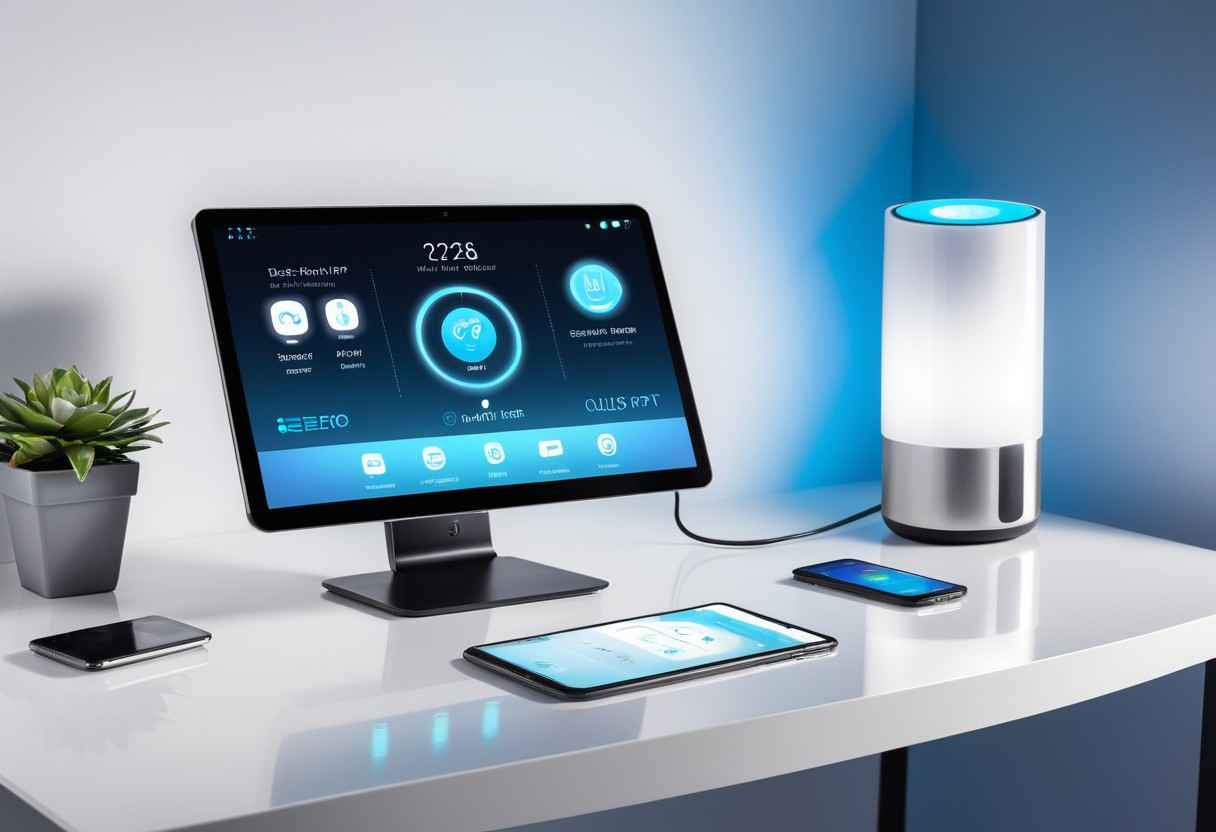Traditionally, ensuring one’s family and valuables remained safe relied solely on locks, alarms, and a watchful eye. However, in today’s increasingly connected world, relying on standard protection practices is no longer enough. The latest smart technology has revolutionized security, giving homeowners innovative and effective ways to shelter their space remotely. This article will explore several intelligent devices that can strengthen your safeguards, providing reassurance and robust defenses wherever you are.
The Rise of Intelligent Home Security
The integration of clever contraptions into protection plans has noticeably increased in recent years. A report from MarketsandMarkets predicted the savvy dwelling market will grow from $78.3 billion in 2020 to $135.3 billion by 2025, expanding 11.6% annually. This growth stems from heightened awareness of security, technological developments, and the convenience of smart appliances.
Advantages of Intelligent Home Security Devices
Remote Seeing and Commanding
Perhaps the most significant benefit of intelligent security appliances is monitoring and controlling your dwelling from afar. Via mobile programs, property owners can view live camera feeds, receive alerts about strange occurrences, and lock or unlock entryways remotely.
Real-time Notifications
Intelligent protection setups can instantly warn your phone should any unusual action happen. Whether it’s a door opening unexpectedly, movement found in a specific region, or a smoke detector triggering, you’ll know right away.
Integration with Other Smart Devices
Smart security devices can seamlessly integrate and coordinate with other smart home devices, developing a comprehensive and interconnected security network. For example, security cameras may link to intelligent lights switching on when motion is detected, or alarms sounding when a security breach is identified.
Enhanced Deterrence and Prevention
The presence of smart security devices can serve as a deterrent to potential wrongdoers. Visible security cameras, video doorbells, and motion sensor lights may discourage burglars from targeting your home.
Essential Smart Home Security Devices
Smart Security Cameras
Smart security cameras are a cornerstone of any smart home security system. These cameras offer high-definition video recording, night vision capabilities, and two-way audio functionalities. Some advanced models also feature facial recognition and AI-powered motion detection analytics. Popular options include the Arlo Pro 4, Google Nest Cam, and Ring Spotlight Cam.
Video Doorbells
Video doorbells are an excellent addition to your home security arsenal. They allow you to see and communicate with anyone at your door, even when you’re not present. This is particularly useful for preventing package theft and screening visitors. Leading video doorbells include the Ring Video Doorbell 3, Nest Hello, and Arlo Video Doorbell.
Smart Locks
Smart locks offer enhanced security and convenience, allowing you to lock and unlock your doors remotely. You can also grant temporary access to guests or service providers and monitor who enters and exits your home. Some top-rated smart locks are the August Wi-Fi Smart Lock, Schlage Encode, and Yale Assure Lock SL.
Motion Sensors and Smart Lights
Motion detectors can perceive any movement within their scope and trigger warnings or illuminations. When incorporated with intelligent lights, they can illuminate particular parts of your home, frightening off prospective trespassers. Brands like Philips Hue and LIFX offer smart lighting remedies that can be connected to your security system.
Smart Alarms and Sirens
Intelligent alarms and sirens can be programmed to activate in case of a security breach, emitting loud noises to alert you and your neighbors. They can also dispatch notifications to your smartphone, ensuring you’re conscious of any potential dangers. Options like the Ring Alarm and SimpliSafe Home Security System are dependable choices.
Choosing the Right Smart Security System
When selecting a smart home security system, consider the following factors:
Compatibility
Ensure that the devices you choose are compatible with each other and can be incorporated into a single system. This will allow for smoother operation and better control.
Ease of Installation and Use
Opt for devices that are easy to install and operate. Many smart security devices come with user-friendly apps and instructions, making the setup process straightforward.
Cost vs. Features
While smart security devices can be expensive, it’s essential to balance cost with features and reliability. Invest in high-quality devices that offer the best protection for your budget.
Customer Support and Warranty
Choose brands that offer robust customer support and warranty options. This ensures that you can get help quickly if you encounter any issues with your devices.
Enhancing Security Beyond Devices
While smart devices play a crucial role in home security, there are additional measures you can take to further enhance your safety:
Regular Maintenance and Consistent Updates
Ensure your clever devices are kept enhanced with the most up-to-date programming and products. Consistent servicing confirms they function correctly and are secured against possible weaknesses.
Secure Your Network
Because intelligent devices are connected to your dwelling system, shielding your Wi-Fi with strong passwords and encoding is essential. Contemplate utilizing an independent system for your clever devices to decrease the danger of hacking.
Teach Your Family
Be certain that all family participants comprehend how to utilize the bright protection framework and appreciate the significance of keeping up security conventions. Regardless of whether your home is empty, your savvy bolts, sensors, and cameras will keep an eye out for any strange movement.
Future Trends in Smart Home Security
As technology continues to advance, smart home security systems are expected to become even more sophisticated and accessible. Here are some future trends to look out for:
Artificial Intelligence and Machine Learning
AI and machine learning are set to play a pivotal role in the evolution of smart home security. These technologies can enhance the accuracy of motion detection, facial recognition, and threat assessment, reducing false alarms and improving overall system efficiency.
Enhanced Interconnectivity
The Internet of Things (IoT) will enable even greater interconnectivity between various smart devices. This means that security systems will be able to communicate more effectively with other household devices, creating a more cohesive and automated home environment.
Biometric Authentication
Biometric security measures, such as fingerprint scanning and facial recognition, will become more prevalent in smart locks and security systems. These technologies offer a higher level of security compared to traditional passwords and PINs.
5G Integration
The rollout of 5G networks will significantly improve the speed and reliability of smart home security systems. Faster internet speeds will enable real-time monitoring and instant alerts, even in high-definition video feeds.
Eco-friendly Security Solutions
As sustainability becomes a priority, expect to see more eco-friendly security devices that consume less power and integrate with other green technologies, such as solar panels and energy-efficient lighting.
Addressing Common Concerns
While smart home security systems offer numerous benefits, they also raise some common concerns that homeowners should be aware of:
Privacy Issues
With the increasing number of cameras and sensors in homes, privacy can become a significant concern. It is crucial to ensure that your security devices are secure and that your data is protected from unauthorized access. Choose devices with robust encryption and privacy features.
Cybersecurity Risks
Smart devices connected to the internet can be vulnerable to hacking. Protect your home network by using strong passwords, regularly updating your devices, and considering the use of a separate network for your security devices.
Cost Considerations
While the initial investment in smart security devices can be high, consider the long-term benefits and potential cost savings from preventing theft or damage. Look for devices that offer the best value for money and consider starting with the most critical components before expanding your system.
Tips for Maximizing Your Smart Home Security
To get the most out of your smart home security system, consider the following tips:
Regularly Update Software and Firmware
Keeping your devices updated ensures they have the latest security patches and features. Set up automatic updates where possible to minimize the risk of vulnerabilities.
Perform Routine Maintenance
Regularly check and maintain your security devices to ensure they are functioning correctly. Replace batteries, clean camera lenses, and test alarms periodically.
Customize Your Security Settings
Take the time to configure your security system according to your specific needs. Adjust sensitivity settings, set up custom alerts, and integrate your devices with other smart home systems for a tailored security solution.
Conclusion
Clever devices have changed family security, offering unmatched assurance and comfort. By contributing in keen cameras, entrance alert frameworks, astute locks, movement sensors, and alerts, you can make a strong and exhaustive security framework for your home. Moreover, joining these gadgets with each other and following best hones for support and system security will additionally upgrade your insurance.



